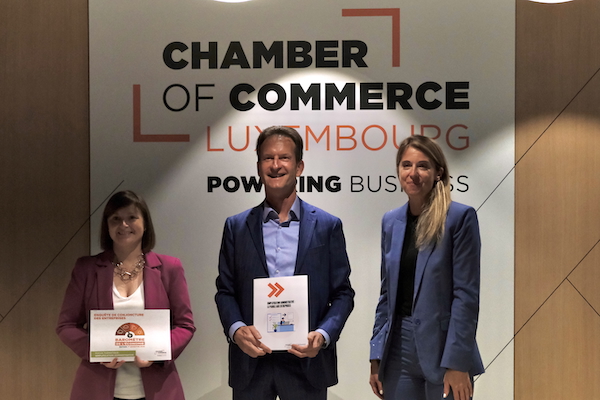 Christel Chatelain, Director of Economic Affairs at the Luxembourg Chamber of Commerce; Carlo Thelen, Director General of the Luxembourg Chamber of Commerce; Stéphanie Damgé, Director of Entrepreneurship at the Luxembourg Chamber of Commerce;
Credit: Steven Miller, Chronicle.lu
Christel Chatelain, Director of Economic Affairs at the Luxembourg Chamber of Commerce; Carlo Thelen, Director General of the Luxembourg Chamber of Commerce; Stéphanie Damgé, Director of Entrepreneurship at the Luxembourg Chamber of Commerce;
Credit: Steven Miller, Chronicle.lu
On Tuesday 8 July 2025, Luxembourg’s Chamber of Commerce in Luxembourg-Kirchberg held a presentation on the results of its latest bi-annual survey on the business climate in the Grand Duchy.
The press conference, presented by Director General of the Chamber of Commerce, Carlo Thelen, included contributions from Director of Economic Affairs, Christel Chatelain, and a series of recommendations in relation to administrative simplification from Director of Entrepreneurship at the Chamber of Commerce, Stéphanie Damgé.
Carlo Thelen began by noting that despite an improvement in the economy over the past six months, driven by lower interest rates and renewed confidence in specific sectors, there had been a notable impact on medium-term confidence due to geopolitical tensions. He highlighted that after two years below the 50-point threshold, in the first semester of 2025 Luxembourg recorded a score of 51.4 on the Business Climate Index, a 2.1-point increase which reflected slightly better prospects for activity, employment and investment. However, he noted that this still lags some distance behind the pre-crisis level of 63.3 recorded in the first half of 2019 and emphasised that this increase is encouraging but “remains extremely fragile”.
According to the Chamber’s report, manufacturers are regaining confidence in their company's medium-term future, recording an increase of 27.5 points (83%) compared to the last half-year, whereas the Financial Sector recorded a drop of 15.5 points for confidence in their company's future (70%) and a drop of 13 points for confidence in the future of the Luxembourg economy (64% ). Across the Transport industry and HORECA industry, respondents noted a drop in confidence in their company's future at a level of 66% (-14 points) and 63% (-10 points), respectively.
Mr Thelen remarked that, despite Luxembourg’s size, in terms of competition “we have to be better than the others”. He said: “It is true that we have a big structural problem, we are in a situation where we are in a post-administrative situation. We have energy costs, we have production costs and we have to make reforms.”
In terms of profitability and employment numbers, the report detailed that downward expectations are particularly marked in industry and trade (30%) but are showing signs of recovery, with downturn expectations falling to 25% (compared to 39% six months ago) and 16% (compared to 28%), respectively. Upward expectations are mainly driven by the energy sector (30%), hospitality (28%) and financial services (24%).
In terms of employment, the report stated that 70% of companies plan to maintain their workforce over the next six months, despite uncertainties surrounding the current economic climate, with 18% of firms planning to increase their headcount and 13% planning to reduce it.
Christel Chatelain noted that “we have very marked sectoral differences” and “the last semester was more difficult than anticipated”. She said: “In terms of job creation, it is the financial and non-financial services that are particularly optimistic about the future. Construction and catering are a little less pessimistic than six months ago. On the other hand, in the transport sector, there is a clear degradation.”
Stéphanie Damgé then provided a breakdown on the Chamber’s paper on administrative simplification, which highlighted that despite the Government prioritising administrative simplification, the opinion among businesses is that administrative procedures are becoming too complex. According to the report, only 3% of businesses reported any simplification in processes over the past year and 35% say procedures have become more complex. Notably, no firm with more than 250 employees had seen any relief. As a result, the House of Entrepreneurship conducted a qualitative study of 50 Luxembourgish firms to gather concrete testimonials on daily administrative obstacles. This study has helped in the production of a series of concrete recommendations, which the Chamber announced it has submitted to the Ministry of the Economy in a detailed report.
Regarding simplification measures, the Chamber reported that firms had prioritised three areas: a single contact point (both online and in person) connected to multiple administrations (75% favourable); extension of the “right to make mistakes” (73%) and the expansion of the Once‑Only principle (71%).
Stéphanie Damgé said: “I would like to emphasise that it is essential that we work on administrative simplification so that we as a country can reduce costs and gain time to focus on low-cost jobs and develop our services.” She added: “This is the innovation that we believe to be important for the economy to stay competitive.”
The 13th edition of the Barometer of the Economy was compiled from feedback gathered between 22 April and 14 May 2025 from 580 Luxembourgish firms with at least six employees.








